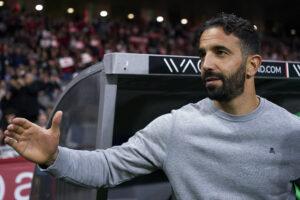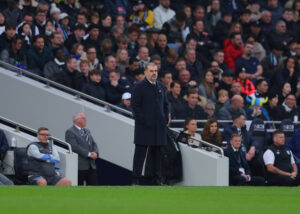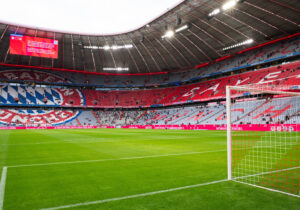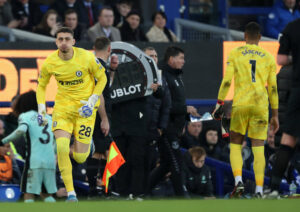Put simply, it has not been the best of starts for Unai Emery and nothing like the ‘new dawn’ that so many Arsenal fans had hoped for and even dreamt of during the decade-long decline under Arsene Wenger. Although it is undeniably ‘early days’ (Emery has only been in charge for four Premier League games so far), it is also undeniable that he has not exactly hit the ground running. Instead, like his team in most of those four games, he has limped into the new season.
Unai Emery Hits the Ground Limping After Four Games
Not Quite an Immediate Impact
The greatest managers make an immediate impact when they arrive at a new club – indeed, some of them make an impact even before they arrive at a new club. The best recent example of that is the young Jose Mourinho. The old (i.e. current) Mourinho may be struggling at Manchester United, where his own counter-attacking instincts are at odds with the desire to attack constantly that is supposedly built into the DNA of the club. However, the younger version twice spectacularly announced his arrival at his next club even before he had left his old one. In the two Champions League finals that he has won, with Porto in 2004 and with Inter in 2010, Mourinho publicly discarded his winner’s medal before leaving the pitch, in a clear signal of his intent to move on and succeed with his next club. Given that it appears increasingly unlikely that Mourinho will ever win another Champions League, he may ultimately regret not enjoying his two victories more, but that is another matter.
Other managers have similarly announced their intention to get to work – i.e. to get winning – almost immediately. When Diego Simeone took over at Atletico Madrid halfway through the 2011/12 season, he laid down the law for his new and underachieving charges right from the start and ended the season by winning the Europa League. Indeed, even previous Arsenal managers have been capable of making an almost instantaneous impact on arrival at the club. For example, in 1996, Arsene Wenger insisted that Arsenal buy Patrick Vieira from AC Milan even before he himself had arrived in England from Japan. And ten years earlier, George Graham soon began weeding out the older players, like Steve Williams and Kenny Sansom, who had been coasting for so long and promoting the young players, like David Rocastle and Mickey Thomas, who would go on to win the League Cup at the end of his first season and two League titles in the next five years.
The contrast with Emery’s arrival at Arsenal could not be starker – indeed, that contrast might even explain why the club were so eager to hire Emery in the first place, rather than even attempting to acquire an obviously superior manager such as Simeone. Increasingly, some Arsenal fans suspect that the club initially floated the idea of hiring an unproven manager like Mikel Arteta to replace Wenger, so that the eventual hiring of Emery would not appear so utterly underwhelming.
First, Emery failed in the summer to sign the number and quality of players that were so obviously required to revive Arsenal. Admittedly, even before he was appointed, the club had made it public knowledge that the transfer funds available to him would not be anywhere near the sum that was needed to kick-start the club again. Nevertheless, the point is that a better manager than Emery would have insisted on at least a doubling of those funds if he were to make any kind of instant impact. The fact that Emery was seemingly happy to attempt to rebuild the club without being given (or even apparently asking for) the necessary financial tools to do so immediately prompted many fans to question his managerial ability.
Secondly, Emery has failed, at least so far, to integrate those players that he did buy over the summer. Ironically, it is the least heralded and least expensive of those signings, Mattéo Guendouzi, who has impressed most. In the process, however, Guendouzi has been keeping Lucas Torreira, the far more expensive and far more lauded defensive midfielder who had done so well at the World Cup for Uruguay, out of the side, or at least the starting eleven. Similarly, Emery has retained Petr Cech in goal rather than promoting his new £20 million goalkeeper, Bernd Leno, despite the fact that Cech is maintaining his pretty awful form of last season and is visibly struggling with Emery’s instructions to pass the ball out from the back rather than kicking it long.
Finally, and most worryingly, so far Emery only seems to have added to the team’s existing problems rather than actually addressing them, let alone beginning to solve them. Those problems, of course, are legion, affecting every part of the team. In addition to the obvious difficulties in goal, incredibly the defence appears even worse now than it did under Wenger. That is especially true in central defence, where Sokratis Papastathopoulos’s obvious lack of pace is prompting some fans to wonder whether he not only looks like Christian Vieri, the former Italy striker but actually is him, so slow is he.
Persistence Not Paying Off
In midfield, Emery has persisted with Granit Xhaka, who is now in his third season at Arsenal but still looks like a complete newcomer. And in attack, although there is obvious goal-scoring and assist-making potential in the two strikers (Aubameyang and Lacazette) and three number tens (Özil, Mkhitaryan and Ramsey), there is absolutely no natural width. The only apparent “wide players” are Iwobi and Welbeck, neither of whom are actual wingers and neither of whom merit a place in the team on ability alone.
It is not only on the pitch that Emery appears to be apeing Wenger. Off the pitch, too, the same problems of mismanagement persist. In particular, Aaron Ramsey is fast becoming the new Alexis Sanchez, as he has entered the last year of his contract but still maintains his place in the first eleven. Even the most financially illiterate football fan knows that once a player enters the last two years (never mind the last year) of his contract, the club should either persuade him to sign a new contract or sell him. It may be true that, unlike Wenger, Emery is no longer in charge of players’ contracts, but nevertheless, the principle still applies – sign or sell. Doing anything else, such as hoping that the player will somehow change his mind and re-sign, is almost always doomed to fail, as proved to be the case with Sanchez.
Of course, Emery is only four games in and as a result many fans and even many football writers are giving him the benefit of the doubt, arguing that the results so far should come with some sort of asterisk attached, as if to excuse or at least mitigate the early problems (or rather the continuation of all the old problems). The difficulty with that approach, though, is that in the minds of many fans Emery already had an asterisk or two attached before he even arrived at the club.
A Hard Man to Replace
In replacing Wenger, Arsenal should have been looking for a man with two obvious attributes: first, that he had won one of the big five European leagues (England, Spain, Germany, Italy or France); and, secondly, that he had done well (or at least better than Wenger) in the Champions League. Obvious candidates such as Simeone and Max Allegri at Juventus met those criteria and so, on the surface, did Emery.
On closer inspection, however, Emery’s two greatest achievements are not nearly as impressive as they seem and hence are perhaps deserving of an asterisk of some kind. He may have won the French League while in charge at Paris Saint-Germain, but he also lost it in his first season, to Monaco, despite the fact that PSG’s complete financial dominance of French football means it is actually harder for their manager to lose the league than to win it. Similarly, although Emery undoubtedly won a hat-trick of Europa Leagues with Sevilla, thus qualifying for the Champions League, he failed miserably in the Champions League itself, sending Sevilla back into the Europa League for another tilt at that far inferior competition. Consequently, many Arsenal fans believe that Emery did not actually meet their criteria for a new manager and so should never have been appointed in the first place.
There is another factor, almost another ‘asterisk’, to consider, which is that Arsenal have already endured an incredibly long period of drift and decline (more than a decade in total) under Wenger. During that time, appallingly bad habits, both on and off the field, had become ingrained. As a result, it was absolutely imperative for the new Arsenal manager to signal his intent to do things differently by stamping his authority on the club immediately and hitting the ground running with a new style of play and new, improved players. Emery has absolutely failed to do any of that and so the judgment on his first month in charge at Arsenal is, inevitably, ‘must do better – much better’. Whether he will be able to in the medium to longer term is at the very least open to question.
Main Photo






